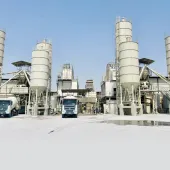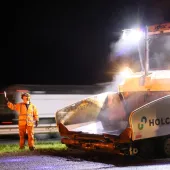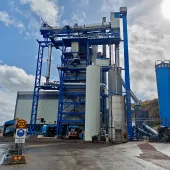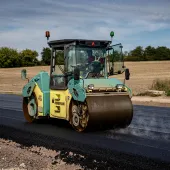Ammann continue to reduce CO2 emissions
The concentration of CO2 in the atmosphere rose from 320 to 386 ppm (parts per million) between 1958 and 2000. As a result, the global temperature has risen by 0.7°C and the sea level by 17cm. The snow-covered regions of the Earth have been reduced by 10%. Modern technology can help to significantly reduce the carbon monoxide emissions of a standard asphalt plant and save costs to boot. Ammann is at the forefront of these groundbreaking developments.
Model calculations on the future of the global climate are based on various scenarios: one of the more optimistic assumes an average warming rate of 1.8°C by the year 2100. As a reaction to these insights, the countries that have ratified the Kyoto Protocol have agreed to reduce the levels of CO2 and other greenhouse gases to 5% below the value of 1990 – a goal it is hoped will be achieved between 2008 and 2012.
Every sector of industry and every member of society is called upon to contribute towards achieving this globally agreed goal. The asphalt mixing plants used in asphalt road construction are a major source of CO2 emissions, as the majority of energy is used to dry and heat the aggregate. This energy stems from fossil fuels. Ammann has a number of solutions at its disposal that will contribute towards achieving the global goals relating to CO2 reduction.
The two decisive aspects of a ‘greener’ asphalt industry are lower operating temperatures and the use of as much recycled asphalt as possible. In general, the following rule of thumb applies: ‘Energy consumption equals CO2 emissions, and energy consumption also equals production costs.’ This means that a reduction in energy consumption goes hand in hand with a reduction in production costs and CO2 emissions.
Fewer emissions with low-temperature asphalt
Lower asphalt mixing temperatures lead to reductions in many kinds of emissions. That is why the industry is introducing a so-called warm-mix asphalt. This asphalt is produced and processed at a temperature of around 100°C instead of the usual 160°C. The advantages of low production temperatures are obvious: less fuel consumption and speedier cooling mean traffic can flow again sooner. Additionally, emissions (gases and smoke) are also reduced on the plant and on the building site, resulting in a significant improvement for workers, machine operators and neighbours. Various methods of producing low-temperature asphalt are available; they include, for instance, the use of additives, foams, special types of bitumen or a combination of these methods. It is usually possible to lower the mixing temperature by at least 20°C and sometimes by as much as 70°C. Various technologies are available on the market depending on the plant operator and the conditions on the construction site. Ammann offers a range of solutions for producing low-temperature asphalt, such as additive feed or the use of WAM foam technology.
The solutions range from special modules in the plant control system to additional plant components.
Asphalt recycling through parallel drum technology
According to studies, the production of new bitumen causes 13kg of indirect CO2 emissions per tonne of new asphalt. Increasing the proportion of recycled asphalt is therefore equivalent to a direct reduction in overall CO2 emissions of the road construction industry. Even today, large quantities of asphalt are simply placed into storage or used for insignificant applications. However, it would be more appropriate with regard to sparing our resources to use the available recycled asphalt gained from high-quality bitumen and processed aggregate in high-performance plants for the construction of new, long-lasting roads. Ammann recognised the importance of asphalt recycling at an early stage. Ammann introduced parallel drum technology more than 20 years ago; it has meanwhile become the recognised standard for quality, recycled asphalt. Ammann continued its innovative course in 2008 by introducing the first drum with counterflow technology that enables the asphalt industry to utilise 100% of recycled asphalt. The route to greener roads is therefore predetermined.
Sources of CO2 emissions in asphalt production
Depending upon the geographical region, the production of one tonne hot mix asphalt generates approximately 46kg of CO2 (without material transport). Half of these emissions are created indirectly prior to processing in the mixing plant. The other half arises directly at the plant during the asphalt production process.
The indirect CO2 emissions stem mainly from bitumen production, mineral processing and the generation of electricity. The majority of plant-based emissions are due to the drying and heating processes that take place in the drier drums, regardless of whether fresh or recycled asphalt is used. The CO2 emissions produced by the wheel loader and oil-heated bitumen tank are negligible in comparison to drum emissions.
Optimised WAM Foam lowers asphalt temperature to 115°C
Ammann has industrialised a low-temperature asphalt technology in cooperation with Shell and Kolo Veidekke that is implementable with a minor investment in plant conversion technology. The production temperature of WAM Foam Asphalt is 115°C. This is achieved by first adding all aggregate with a diameter of more than 4mm to the mixer. Soft bitumen is then added to coat the rough additive. The hard bitumen is then processed into foam during the third and most important step. Sand and a very fine filler substance are then added to the drum. A bitumen foaming ramp generates a precisely balanced and homogeneous foam that meets the high demands on quality. The properties of the ensuing warm mix asphalt are similar to those of the hot mix asphalt produced at higher temperatures. Long-standing trials in the field have verified outstanding road surface properties. This technology puts asphalt producers in a position to reduce their CO2 emissions without having to compromise the high quality of their products. We will be pleased to advise you on this issue.
RA 100 – new roads from 100% reclaimed asphalt
The first asphalt mixing plant capable of producing quality aggregate from 100% reclaimed asphalt (RA) using a special parallel drum has been taken into operation in North Germany. An improved drying and heating process increases efficiency in comparison to conventional parallel drums and enables fuel savings of around 10%. The 100% RA parallel drum works according to the counter-flow principle; the method is unusual for this type of drum and output temperatures correspond with those of processable asphalt.
The ambitious project was started in August 2006 in response to ever more concrete demands for greater RA proportions, raised in particular in European markets such as Germany, the Netherlands and Switzerland. The waste product of yesterday is increasingly becoming a valuable base material that is meanwhile used in many quality asphalt recipes.
Ammann Equipment Ltd, Bearley, Stratford-upon-Avon, Warwicks CV37 0TY; tel: (01789) 203235; fax: (01789) 414495; email: sales@ammannuk.co.uk; website: www.ammann.co.uk









